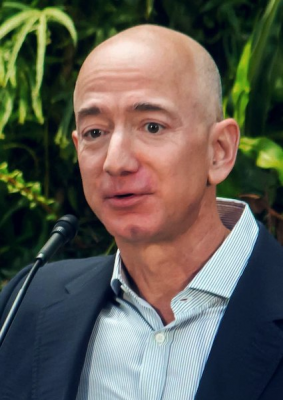10% of Jeff Bezos' wealth could prevent 41 million people from starving to death

Jeff Bezos - Wiki image: https://www.flickr.com/photos/seattlecitycouncil/39074799225/
Source: Trócaire
Jeff Bezos' net worth increase during Covid was $65 billion. Jeff, just 10% of your net worth INCREASE would save 41 million people about to die from hunger. We need you, NOW! Can we talk?
This was the provocative but stark tweet that David Beasley, Executive Director of the World Food Programme, posted in November addressing the founder of Amazon. The truth behind the numbers is startling and the message very clear: against the backdrop of Covid, the rich became richer, and the poor became poorer.
According to Credit Suisse research, the number of millionaires globally increased by 5.2 million to 56.1 million during the pandemic. The number of ultra-high net worth individuals grew by 24% worldwide in 2020, the fastest rate of increase since 2003.
In contrast to all of this, the number of people unable to access food and facing hunger globally since the pandemic has risen dramatically. The UN says that in Africa over one-fifth of the population faced hunger in 2020, 46.3 million more than in 2019. Meanwhile the number of people facing hunger in Asia also grew by a shocking 50 million in 2020.
These intolerable global inequalities do not reflect the concept of 'we are all in this together'.
Across Trócaire programmes in Africa we are witnessing and responding to the devastating triple impact of covid, climate change and conflict are having on the lives of the most vulnerable. Covid has brought devastating health consequences. Lockdown measures have resulted in people not being able to travel to markets to sell their goods, or to go in search of daily labour to earn their living.
Farmers have been unable to tend to their fields, which produce the food they need. Businesses are struggling. Inflation has been rising and unlike Ireland and other European countries there are no government safety nets and supports. Yet, COVID-19 vaccination rates stand at only 7.35% for the continent of Africa, with many countries hovering at around only 1% - another indicator of the stark inequalities we live with.
The impact of covid has been compounded by climate change across many parts of Africa. Somalia is experiencing its third consecutive below-average rainfall season since late 2020.Most of southern, central, and north-eastern Somalia have received little to no rainfall since June, as the October to December 2021 rains are delayed.
South Sudan continues to experience one of the worst food insecurity emergencies globally. And Southern Ethiopia has had its driest conditions for October in forty years leading to the loss of livestock and harvests.
And finally, there is conflict, a key driver of hunger as people are forced to flee fighting and insecurity. Food is used as a weapon of war, and food systems and markets collapse.
At the end of 2020, there were 82.4 million forcibly displaced people globally. Of those, 86% are hosted in developing countries. The World Bank estimates that by 2030, up to two thirds of the world's poor will live in fragile and conflict affected states.
In eastern DRC, where Trócaire works, the security situation worsened in 2020 leaving 5.3 million people displaced - the highest level in Africa. Many communities where we work were displaced multiple times making it impossible to have any sustained access to food.
In Ethiopia, ongoing conflict has limited humanitarian access to Tigray, leaving hundreds of thousands exposed to hunger, and in Myanmar we have witnessed how forced displacement has led to previously stable and thriving communities falling into situations of desperate humanitarian need.
The scale of the numbers impacted by hunger can sometimes overwhelm us. But behind these numbers are mothers, children, fathers, grandparents - people with the very same aspirations as us to live healthy and peaceful lives, with the ability to provide for their families and to give their children as many opportunities as possible.
Instead, people cannot provide for themselves or their children, facing the pain of hunger, the theft of their dignity and for many the loss of their lives.
Addressing the Global hunger pandemic requires us to urgently address climate change, tackle the structural and political drivers of conflict and respond to covid in a way that means no one is left behind. All this requires political will and a belief that all of humanity has the right to aspire to the same quality of life.
As we sit around tables with our loved ones over the next week, share gifts and find comfort in the warmth of our mothers, fathers, grandparents, children and friends, let us also remember those without a table, without food, without comfort.
Let us commit to no longer tolerating the intolerable and accepting that the rich simply get richer while the poor get poorer. In 2022, let us challenge the unethical growth in individual wealth and commit to contributing to a more equal, compassionate, and just world.
Sorcha Fennell is Director of International with Trócaire
LINK
Trochaire - www.trocaire.org/


















